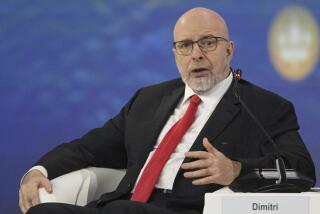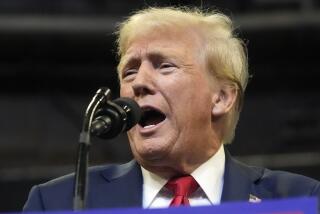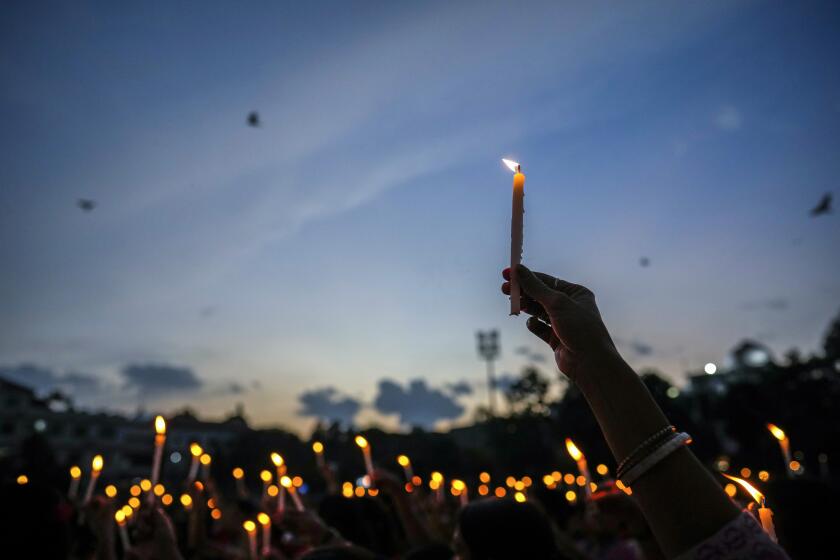Mueller investigation digs for longtime Trump advisor Roger Stone’s connections to WikiLeaks
In recent weeks, a grand jury in Washington has listened to more than a dozen hours of testimony and FBI technicians have pored over gigabytes of electronic messages as part of the special counsel’s quest to solve one burning mystery: Did longtime Trump advisor Roger Stone — or any other associate of the president — have advance knowledge of WikiLeaks’ plans to release hacked Democratic emails in 2016?
While outwardly quiet for the last month, Robert S. Mueller III’s investigators have been aggressively pursuing leads behind the scenes about whether Stone was in communication with the online group, whose disclosures of emails believed to have been hacked by Russian operatives disrupted the 2016 presidential campaign, according to people familiar with the special counsel probe.
Stone, who boasted during the race that he was in touch with WikiLeaks founder Julian Assange, has said since that his past comments were exaggerated or misunderstood. Both he and WikiLeaks have adamantly denied they were in contact.
However, prosecutors are closely examining both public comments and alleged private assertions that Stone made in 2016 suggesting he had a way to reach Assange, the people said.
Last month, Randy Credico, a onetime Stone friend, told the grand jury that the Trump loyalist confided during the 2016 campaign that he had a secret back channel to WikiLeaks, according to a person familiar with the matter.
In a series of interviews with the Washington Post, Stone said his only connection to the group was through Credico, a liberal comedian who had hosted Assange on his New York radio program in 2016.
The special counsel’s prosecutors have also zeroed in on Stone’s relationship with conservative journalist and conspiracy theorist Jerome Corsi, examining whether he served as a conduit between Stone and Assange, according to another person familiar with their interest. Corsi appeared before Mueller’s grand jury last month, and FBI agents have recently been seeking to interview Corsi’s associates, according to the person.
In addition, investigators have scrutinized Stone’s communications with Trump campaign officials about WikiLeaks, according to people familiar with the probe.
One apparent line of inquiry: whether Stone lied to Congress about his alleged contacts with WikiLeaks during the presidential race, according to the people.
The question of whether Trump associates were in contact with WikiLeaks is at the heart of Mueller’s inquiry. According to charges filed by the special counsel in July, Russian military intelligence officers used an online persona called Guccifer 2.0 to distribute hacked Democratic emails through WikiLeaks. The Russian operatives also used Guccifer 2.0’s Twitter account to send messages to Stone, who has said the exchanges were benign.
The online organization has said it had no contact with Stone. “WikiLeaks & Assange have repeatedly confirmed that they have never communicated with Stone,” the organization tweeted in March 2017.
Stone told the Post that Credico “was my principal source regarding the allegedly hacked emails published by WikiLeaks,” a claim Credico has denied. Stone added that one of his remarks in 2016 predicting that WikiLeaks was about to release information related to Clinton was informed by another journalist’s tip that he was forwarded by an associate.
Stone called Mueller’s investigation illegitimate and said the special counsel, who has interviewed at least seven of his associates, is trying to pressure him to flip on President Trump.
“The special counsel pokes into every aspect of my social, family, personal, business and political life, seeking something — anything — he can use to pressure me, to silence me and to try to induce me to testify against my friend Donald Trump,” Stone said in a recent videotaped fundraising appeal. “This I will not do. When I say I won’t roll on the president, what I mean is I will not be forced to make up lies to bring him down.”
A spokesman for the special counsel declined to comment.
Questions about Stone’s possible connection to WikiLeaks were stoked by encouraging comments he made after the group released thousands of hacked emails from key Democratic figures, beginning on the eve of the Democratic National Convention in July 2016.
The following month, Stone began predicting that WikiLeaks would strike again before the election. In a widely reported speech to a Republican group in South Florida in early August 2016, Stone boasted: “I actually have communicated with Assange.”
Then, on Aug. 21, he tweeted: “Trust me, it will soon [be] Podesta’s time in the barrel.” Six weeks later, WikiLeaks began posting online emails stolen from the account of Hillary Clinton’s campaign chairman, John Podesta.
Stone now says his tweet was a reference to opposition research he got from Corsi about the business dealings of Podesta and his brother, Democratic lobbyist Tony Podesta.
Two days after his Podesta tweet, Stone appeared on Credico’s radio program. Credico asked whether an “October surprise” was coming and stated that Stone had “been in touch and indirectly with Julian Assange,” according to a clip obtained by CNN.
“I don’t want to intimate in any way that I control or have influence with Assange because I do not,” Stone responded on the show. “We have a mutual friend, somebody we both trust and therefore I am a recipient of pretty good information.”
Stone now says he was referring to Credico. “I certainly couldn’t out Randy on his own radio show, but the person I refer to is of course him,” he told the Post. “He is in on the joke from the beginning.”
As election day neared in 2016, Stone continued his predictions. On Sunday, Oct. 2, he tweeted: “Wednesday @HillaryClinton is done. #WikiLeaks.” When there was no release on Wednesday, Oct. 5, he tweeted: “Libs thinking Assange will stand down are wishful thinking. Payload coming #Lockthemup.”
Two days after Stone’s “payload” tweet, WikiLeaks published the first tranche of Podesta’s emails — and then dropped new batches nearly daily before the November vote.
When Stone came under scrutiny for his comments about WikiLeaks after the election, he said he had no advance knowledge of the hacking and was just conveying information he had received from Credico.
In a letter to the House Intelligence Committee in September 2017, Stone also identified Credico as his source on WikiLeaks, according to a person familiar with the communication.
Credico has repeatedly denied passing any information from WikiLeaks to Stone. Rather, he said he may have speculated about the group’s tactics when he was with Stone. Credico has told allies that he believes Stone used him as a “decoy” to try to explain his claims of having a back channel to Assange.
Mueller’s efforts to unentangle the conflicting accounts of Stone and Credico are complicated by the fact that both men are voluble showmen. They became friends in the early 2000s through a shared interest in liberalizing New York drug laws, but have split bitterly amid scrutiny from the special counsel.
Stone said he believes Credico had sources connected to WikiLeaks and said Credico offered to get information from Assange’s circle for him.
Two Stone associates, filmmaker David Lugo and attorney Tyler Nixon, also told the Post that Credico acknowledged in conversations last year that he was the source of material for Stone’s statements and tweets about WikiLeaks.
Nixon said he would be willing to testify before the grand jury about a dinner in which Credico fretted that his liberal friends would be displeased that he was a source for the arch-conservative Stone. Lugo provided the Post with text messages in which Credico said: “I knew Rodger [sic] was going to name me sooner or later and so I told you that I’m the so-called back Channel.”
An attorney for Credico declined to comment on Lugo and Nixon’s claims.
For his part, Credico said he recalls that Stone claimed in a September 2016 conversation that he had a mystery WikiLeaks contact. Credico said that he wasn’t sure at the time whether to believe him.
“I remember saying, ‘Roger, I thought you had a back channel,’” Credico said. “He said something to the effect of, ‘Yes, but I can’t use him all the time.’” Credico relayed that account to the grand jury last month, according to a person familiar with his testimony.
Stone at first denied Credico’s claim that he suggested having a conduit to reach WikiLeaks, calling his old friend a “perjurer” and saying he’d relish the opportunity to confront Credico in court.
Later, Stone acknowledged to the Post that he “obliquely” told Credico in an email that he had “a second source” of WikiLeaks information besides the New York comedian.
He told the Post that person was not a direct conduit to WikiLeaks. He said he was referring to information another associate passed to him from a journalist who wrote in a July 2016 email that he had heard WikiLeaks would be releasing information related to the Clinton Foundation.
Stone has also said that he was getting information about the Clintons in 2016 from Corsi. He told the House Intelligence Committee that his Podesta tweet was “based on a comprehensive, early August [2016] opposition research briefing” from Corsi.
Corsi gave a similar account in a March 2017 Infowars column in which he named himself as Stone’s source for the Podesta tweet and confirmed Stone’s timeline, saying they’d had detailed conversations about Podesta from Aug. 14, 2016, through Aug. 31, 2016.
Mueller is now examining their exchanges.
Corsi’s attorney, David Gray, said in an interview last month that Corsi had been subpoenaed by the special counsel, who indicated he was interested in Corsi’s communications with Stone in 2016 and 2017. Gray declined to comment last week.
Stone said he first encountered Corsi around 2015, when the author was writing about presidential politics for World Net Daily, a conspiracy-theory-oriented website. Later, both contributed to Infowars, where Stone still hosts a program streamed live over the internet.
In an interview, Stone suggested that the special counsel may actually be interested in Corsi’s relationship with Trump.
Corsi was a leading proponent of birtherism, the false conspiracy theory that Barack Obama was not born in the United States. In 2011, he wrote the book “Where’s the Birth Certificate?: The Case That Barack Obama is Not Eligible to be President.”
Around that time, Trump took up the conspiracy theory, questioning Obama’s citizenship and demanding that he release his birth certificate.
Stone said that during a conversation with Trump in 2011, “he said to me, ‘Who is this guy, Jerome Corsi?’” Stone recalled.
Stone said he asked Trump why he was inquiring about Corsi.
“I’ve been talking to him,” Stone recalled Trump saying.
Stone said that Corsi also met with Trump during the 2016 campaign. Trump attorney Jay Sekulow declined to comment.
Mueller, Stone added, may have been “more interested in those meetings than anything to do with me.”
The Washington Post’s Tom Hamburger contributed to this report.
More to Read
Sign up for Essential California
The most important California stories and recommendations in your inbox every morning.
You may occasionally receive promotional content from the Los Angeles Times.









